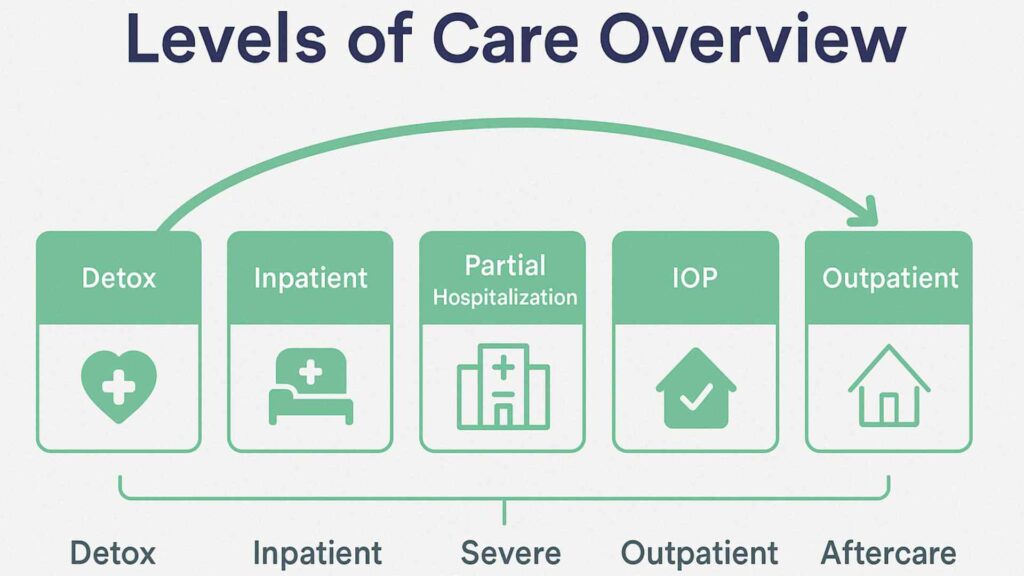Recovering from addiction is a journey that extends far beyond the initial decision to stop using substances. While seeking treatment and building a support network are vital first steps, learning and practicing effective coping skills is what truly sustains long-term recovery.
In this article, we’ll explore the most effective coping skills for addiction recovery, offering practical guidance and real-world examples to help you or your loved one build a strong foundation for lasting sobriety.
Identifying Triggers
The first step on the road to recovery is learning to spot the situations, emotions, or patterns that lead you to substance abuse again. Triggers can be obvious—such as old friends who are still misusing drugs, certain places, or particular social events.
Internal triggers could be negative emotions like anxiety, depression, anger, and loneliness, which may provoke cravings for substances. There are also external triggers involving specific people, places, and situations associated with past substance use, like being around friends who use or visiting bars.
Sometimes, celebratory events can also rekindle associations with substance use during previous celebrations.
By keeping a daily journal or making mental notes about moments of temptation or craving, you start to piece together patterns. Recognizing these connections is empowering. It gives you a head start to avoid those scenarios either or meet them head-on with a smart plan.
Our Relapse prevention program in Toledo, OH can help you recognize triggers, develop healthy coping mechanisms, and build a resilient mindset to maintain sobriety. Our treatment plan is designed to enhance your capacity to handle real-life stressors and emotional challenges without returning to past habits.
Self-Awareness and Acceptance
Addiction thrives in the shadows of denial. Achieving self-awareness requires confronting your emotions truthfully, including those that are difficult to face. When you are self-aware, you can recognize your triggers, emotions, and thought patterns, which is crucial for developing strategies to prevent relapse.
Accepting your substance abuse and the challenges of recovery fosters a compassionate mindset, reducing shame and guilt that often hinder progress. With high self-awareness, you are better equipped to identify early warning signs of relapse, enabling you to take proactive steps to maintain sobriety.
Engaging in self-reflection practices, such as journaling or mindfulness meditation, enhances emotional regulation and supports healthier coping mechanisms. Self-acceptance is linked to greater emotional resilience, significantly improving recovery outcomes and reducing relapse risk.
Acceptance begins with the realization that you need professional help to overcome addiction. One of the benefits of outpatient rehab is flexibility, allowing you to receive professional treatment while maintaining your daily responsibilities at work, school, or home.
Mindfulness and Meditation
Mindfulness enables you to remain grounded in the present moment—allowing you to recognize your urges without being overwhelmed by them. Engaging in meditation, even for only a few minutes each day, will enable you to examine your thoughts and desires with a sense of curiosity and without passing judgment.
By practicing mindfulness techniques, you can reduce anxiety and stress levels, which are common triggers for substance cravings. Regular meditation can help you stay present, allowing you to manage overwhelming emotions and avoid escapism through substance use.
Mindfulness-based approaches can lower the risk of relapse by promoting a positive mindset and increasing self-awareness. Incorporating mindfulness practices into your daily routine fosters emotional regulation and resilience, making you better equipped to navigate the challenges of recovery.
Building a Support Network
Recovery can be a difficult process, and attempting it alone only increases the challenges. Surrounding yourself with supportive individuals who understand your journey can provide invaluable encouragement and accountability.
Engaging with those who have successfully maintained sobriety offers insights and practical strategies for navigating challenges. Regularly participating in support groups, like 12-step programs, fosters a sense of community and connection that is vital for your emotional well-being and relapse prevention.
Creating a diverse support system that includes family, friends, and peers in recovery enhances your resilience by providing multiple perspectives and resources. Having a strong support network during recovery increases your likelihood of maintaining sobriety and experiencing improved mental health outcomes.

Healthy Routine and Structure
Establishing a routine provides structure and purpose to your day. Incorporating consistent daily habits, such as regular meals and exercise, contributes to your overall well-being and supports your physical and mental health during the recovery process.
Maintaining a structured sleep schedule is vital for mental health, as sufficient sleep supports cognitive function and mood regulation, which are essential for developing healthy coping skills.
Regular sleep and balanced meals make you physically stronger, giving you more energy to deal with cravings. Implementing gradual changes rather than attempting a complete transformation at once is more sustainable.
Stress Management Techniques
Deep breathing and mindfulness meditation can significantly reduce your anxiety levels, making them powerful tools in your recovery journey.
Engaging in regular physical activities, like exercise, releases endorphins that boost your mood and alleviate stress, contributing to better mental health. Grounding techniques, such as gratitude journaling and light exercise, help you stay focused on the present moment and manage feelings of overwhelm that may trigger cravings.
Incorporating hobbies and relaxation practices, like yoga or nature walks, promotes emotional stability and provides constructive distractions from recovery-related stressors.
When to Seek Additional Support
Recognizing the moments when your coping skills are insufficient is a critical aspect of maintaining your addiction recovery. If you are experiencing persistent cravings or urges that interfere with your daily life and recovery goals, it is time to seek additional support.
Emotional distress, like anxiety or depression, can become overwhelming, making it crucial to reach out for guidance on coping strategies. Pay attention to early warning signs of potential relapse, such as withdrawing from social connections or increased stress levels.
Significant changes in your behavior, mood, or daily functioning are also indicators that it is time to seek professional help.
Final Thoughts from Abundance Treatment
Building and practicing healthy coping skills is essential for sustaining recovery and navigating the ups and downs of life after addiction.
At Abundance Treatment, we understand that recovery is not a destination but a lifelong journey—one that thrives on ongoing support, connection, and resilience. Our Relapse Prevention Program in Toledo is thoughtfully crafted to help both adults and adolescents safeguard their addiction recovery progress and empower them with the tools, strategies, and community they need to maintain sobriety and well-being.





































